- Home
- Edward Lee
The Black Train Page 2
The Black Train Read online
Page 2
“Mornin’, Mr. Cutton. How have the track inspections looked in my absence?”
“‘Bout as perfect as I ever seen, Mr. Gast.” His struggled to talk through the dryness of his throat. His heart was pounding. “Gauge is dead-on. We’ve done close to five miles already, and we ain’t even been goin’ two weeks. And the coupling work is perfect.”
“Good, good.” Gast turned his darkened face up to the sun. “My wife mentioned that she spoke with you yesterday.”
Cutton’s heart felt like a rock that had just slid down into his stomach. “I—Why, yes, sir, I did tip my hat to her, yes, sir.”
“She tells me you’re a courteous gentlemen—”
“That’s, uh, right kind of her—”
“—even though you’re from Delaware.”
The moment turned rigid. Then Gast and Morris broke out in laughter.
Cutton almost pissed his canvas trousers, but eventually he got it and laughed, too, however nervously.
“I’m just havin’ some fun with ya, Mr. Cutton,” Gast assured. He looked down at them both. “You men are doin’ damn fine work. Keep it up.”
“Yes, sir,” Morris said.
Cutton added, “We surely will.”
Gast took his horse off, back down the track line where the flat cars laden with rail and ties sat.
But Cutton couldn’t help but notice…Gast’s eyes. Just before he’d ridden away, when he’d looked down—the whites of the man’s eyes seemed stained, off-yellow, like maybe jaundice.
“Is Mr. Gast under the weather?” Cutton mentioned.
“Not that I know of. Why?”
Cutton chewed his lips. “Thought his eyes looked a little funny.”
“Looked fine to me, Cutton, and I got a burr in my ass now.”
“Why’s that?”
“He calls me Morris but he calls you Mr. Cutton. Shee-it.” Does he?
“bet’choo suck his willy ever nat, huh?” Morris bellowed a laugh and slapped Cutton hard on the back. “Let’s go to the whorehouse again tonight. Have us some fun.”
Cutton easily remembered Morris’s idea of fun. He was drenched in nervous sweat. “Maybe. I’ll see how I feel after we’re done with work.”
Cutton looked one more time at the staked head. No one noticed, no one cared in the least. Just another killing of a rowdy slave. He shook his head when Morris offered him a chew.
And noticed something.
Ain’t that the damnedest…
The whites of Morris’s eyes looked a bit sickly. Tinged a pale yellow.
Just like Gast.
He shook his head. Must be the light or somethin’, he dismissed.
“You two!” Morris shouted to the two strong-arms in the field. “Get these slaves back on the line. Time to get back to work.” He slapped Cutton hard on the back again, billowing dust. “See ya tonight, buddy.”
Morris got back to his business. The slaves began to branch off into their assigned groups, and soon tools could be heard clanging.
Cutton mounted his horse but held up a moment. His gaze still hung on the severed head and its yawning dead face. Is this really justice? he wondered. Then the most unbidden inclination told him it was more than that.
CHAPTER ONE
I
“So you just leave, just like that?” the voice whined. “That’s so you, Justin. When there’s a problem, all you do is get on a plane and fly away.”
Collier felt cramped in the rental car, and annoyed that the squawking phone call was diverting him from the scenery. “Evelyn, dear, I wouldn’t define a divorce as a problem. It’s merely an event. The problem is the notion that you and I ever thought we could be compatible marital partners…but that’s a moot point by now.”
The tiny cell phone seemed to vibrate when she objected, “What’s that supposed to mean!”
“Look, Evelyn, I have to finish this book. The deadline is next week. If I miss my deadline, then there’s the theoretical possibility that my publisher would cancel the contract in which case I’d have to pay back the fifty-thousand-dollar advance. Now, put your little thinking cap on and consider those ramifications, since you’ll likely get half of that advance in the divorce settlement.”
Silence. Then, “Oh.”
“Yes, my love. Oh. Along with half—and I repeat: HALF. Of everything else I’ve earned.”
Another rail: “Hey, I work, too!”
“Honey. Caterers in L.A. are like old people in Florida, i.e. too many.”
Collier knew he shouldn’t have referred to her failed business endeavor. He knew what she would say even before she said it:
“I’m glad your stupid show’s getting kicked off the air, you pompous asshole!”
Ahh, the good life, Collier thought. True love and domestic bliss. “Evelyn, let’s not fight. I’ll be back in a week to sign the papers, okay? I’m not evading the issue, if that’s what you think. But I have to do this.”
“What do you have to go to Tennessee for? You write books about beer.”
“I only have one more entry before the book’s done, and I think I may have found it here. I need it to be unique. I can’t just throw in some run-of-the-mill microbrew.”
“Well…fine.” She simmered down.
“I’ve got to go now. I left the airport four hours ago, and I’m still lost. Tell you what, I’ll call you midweek to see how you’re doing.”
“Okay. ‘Bye.”
click
Collier felt as though a large animal had just climbed off his back. He banged his elbow when he put the cell phone away. Why’d I ever get married? All my married friends told me not to. When married people tell you to NEVER get married? That’s like the chef coming out of the kitchen and telling you the food sucks. Pretty qualified advice. Evelyn was beautiful, of course, but quite a few other men in L.A. seemed to think so, too. It’s the way of the modern world. You have great sex; then you get married; then you get divorced. And the man gives the woman HALF.
Great sex wasn’t worth it. By now, in fact, he’d forgotten what great sex was.
Deliriously green pastures and farmland swept by on either side. Collier loved the view, especially after four years in L.A. It wasn’t a city, it was a city-state. Hollywood! Spago! Venice Beach! Rodeo Drive! They can have it, he thought. Had the town lost its charm, or was it something else? He found that the older he got, the less interested he was in things. His Food Network TV show, Justin Collier: Prince of Beer, paid enormous money for the first three seasons but now they were giving his slot to some hotshot chef from San Francisco. Seafood Psycho, they were calling it. Just as well. Collier hated L.A., and the show—though it had turned him into a semicelebrity—was wearing him down. At forty-four, most of his hair was gray now, and he felt like a ninny having some makeup girl at the studio dye it for him. His books on craft-made beer always did well enough to make him a solid living, and that’s what he yearned to go back to.
Maybe I’m just getting old, he considered. But forty-four wasn’t old, was it?
Damn…
The only thing Hertz had to rent at the airport was this awkward VW Bug. It looks like a kiddie car, was the first simile that came to mind when the clerk gave him the keys. Worse was the color: sherbet green. Yeah, I can see me driving THIS on the 405. The inside was aggravatingly cramped, but he could still see Lookout Mountain, site of a famous Civil War battle that had put the final nail in Confederate pomp. The image soothed him, not that the mountain signified a wartime slaughter, but the assurance it brought that he was nowhere near L.A.
More miles passed behind him. When he’d run a Map-Quest for Gast, Tennessee, he kept getting that PAGE EXPIRED message. He’d found it on a 7-Eleven map but the convolution of minor roads had turned into a maddening webwork. How hard could it be to find a town with such an unlikely name? It took another hour before he came upon a sign: GAST, TENNESSEE—TOWN LINE. A CIVIL WAR HISTORICAL SITE.
Finally!
The town stood bright in its reincarnated anachron
ism: fine clapboard buildings lining a cobblestone main drag called NUMBER 1 STREET. Normal-looking middleclassers walked to and fro on immaculate sidewalks, past the expected antique shops, bistros, and collector’s warrens. MINIE BULLETS! one sign boasted. BATTLEFIELD MAPS!
At the corner, two elderly ladies strolled by and smiled. Collier smiled back—“Good afternoon, ladies”—but then it appeared they were chuckling. It’s this eyesore on wheels! he realized. The oddball car stuck out here like a sore thumb. Hurry up and turn green! he thought of the traffic light. More pedestrians, now, stopped to eye the car with furtive smiles. That’s definitely making an entrance…He turned aimlessly, just to get away from the passersby but immediately spotted the sign and arrow: LODGING.
Collier bisected roads similarly marked—NUMBER 2 STREET, NUMBER 3 STREET, etc.—but noted the road he was on: PENELOPE STREET. Collier peered ahead. The road side-wound up plush green hills, atop which sat a splendid antebellum house. Could it be a hotel?
Some joint. Collier wasn’t much into architecture but when he pulled round the center court, he couldn’t help but be impressed. An elaborate two-story veranda formed the main structure’s face, propped by Doric columns chiseled with intricate fluting. The center edifice was octagonal and walled by handmade red bricks, while four more one-story wings flanked outward. White clapboard comprised these wings, and each possessed a deep wraparound porch. Out front a granite boy in Confederate dress blew water from a flute into a mortar-and-stone pond beside which grew a gnarled oak tree more massive than any Collier could remember. He parked and got out. The shadow of the central building cooled him.
Lush weeping willows, fifty feet high, fronted the estate, while some even older oak trees seemed to circle the immediate property.
Collier approached. Streams of ivy crawled up the octagon’s eroded brick walls. He noticed several cars parked in a side lot, and hoped they belonged to guests, not just staff; in spite of the building’s old splendor, Collier didn’t want to be the lone lodger. Though he couldn’t be sure, he believed he might’ve seen a face peering at him from a narrow window on the closest addition. The face looked inquisitive, or warped by old glass.
WELCOME TO THE BRANCH LANDING INN, the high stone entablature read. A low brick next to the door had been crudely engraved: MAIN HOUSE, 1850.
White granite blocks framed a massive front door. Since this was obviously a rooming house, he didn’t feel the need to knock in spite of the presence of a peculiar knocker: a face of brass bearing wide, empty eyes but no nose or mouth. For some reason, the knocker caused an odd sensation; then he reached for the brass doorknob and noticed that it, too, had been imprinted with the featureless face.
Collier almost shouted—
An unseen hand opened flat on the small of his back, while another hand opened the door for him.
“Jesus!”
A short woman in her early thirties had come up behind him without making a sound. Collier looked at her after the start she’d given him: short, petite, and shapely. She was barefoot and dressed in a shoddy denim frock. Couldn’t be a guest, he thought, but then he spotted a name tag: HELLO! MY NAME IS LOTTIE.
Collier brought a hand to his chest. “Wow, you really scared me. I didn’t see you.”
She smiled and remained holding the door for him.
“So you work here?”
She nodded.
Now that the scare had receded he noticed that her body was exceptional but her face was less than comely, and her eyes seemed dull, even crooked. She smiled again. A shag of unkempt muddy brown hair had been cropped at the middle of her neck.
The moment seemed disarrayed. She simply stood there without saying a word, holding the door.
“Thank you.”
He entered a small but ornate vestibule which fronted another set of doors, only these were angled plate glass. The thick oval throw rug beneath their feet appeared handwoven.
“So, Lottie. Do you have any rooms available?”
She nodded again.
Not exactly a chatterbox.
A pleasant chime pealed when the next door came fully open. They stepped into an enormous entrance salon, whose thirty-foot-high ceiling dragged Collier’s gaze upward. Very large oil paintings hung high behind the service counter, and higher than those stretched a long stair hall. More patterned throw rugs covered the hardwood floor, these much more refined than the thick vestibule rug. Antique sitting tables surrounded by high-back chairs were arranged about the great open space, and glass-faced book and display cases lined the walls.
Impressive, Collier thought.
Semicircular stairwells swept up on either side of the long mahogany service counter, and behind the counter a wall of stained oak pilasters touted hand-carved flower designs.
“This really is a beautiful place,” Collier mentioned to the girl.
She nodded.
It was twenty feet to the check-in counter; behind it, an old woman’s face looked up and smiled through wrinkles. Midsixties, probably. A storm cloud-gray perm of curls, very short, crawled around her head—the kind of hairstyle that only women close to nursing-home age thought looked good. Even at a distance, Collier could detect the deepness of the wrinkles, and bags under her eyes, and the face seemed almost masculine with its slab cheeks and heavy jaw. Collier immediately thought, If Jack Palance had a twin sister…I’m looking at her.
“We’ll I’ll be!” her peppy twang rang out. “I say it must be celebrity month!”
“Pardon me?”
“I swear I seen you on the TV!”
Collier hated to be “recognized.”
The elderly eyes glittered between puffy lids. “Couple weeks ago we had some fella from the New York Yankees check in, and now we got the Prince of Beer!”
“Hi,” Collier said, depressed already. Now he had to put up the front. “Justin Collier,” he said and extended his hand.
“I’m Mrs. Helen Butler, and welcome to the Branch Landing Inn. That short little thing standin’ next to you’s my daughter, Lottie. I run the place, she keeps it spick-and-span.”
Collier nodded to Lottie, who nodded eagerly back.
“Lottie don’t talk,” Mrs. Butler explained. “Never could for some reason. She tried when she was a tot but could just never get it, so one day she quit tryin’.”
Lottie splayed her hands and shrugged.
Mrs. Butler jabbered on. “Why, I saw ya on the TV just last night.”
“Oh, so you’re a beer connoisseur, Mrs. Butler?”
“Actually, no—I won’t lie to ya. I’se always watch the show comes on after yours, Savannah Sammy’s Sassy Smokehouse.” She added rather dreamily, “I just adore that man, Savannah Sammy.”
That dick! Collier’s pride rebelled. The comment challenged him. First of all, he’s not even from Savannah, he’s from fucking Jersey, and he doesn’t even write his own shows! Collier felt wounded, but what could he say? “Yes, ma’am, Sammy’s a great guy.”
“But don’t get me wrong, your show’s terrific, too. In fact, my son watches it all the time, raves about it.” She leaned forward, lowered her voice. “Say…do you know Emeril?”
“Oh, sure. Great guy, too.” Actually, Collier had never met the man.
“Oh, please, Mr. Collier,” she gushed next. “Please tell me that you’ll be stayin’ with us a spell.”
“Yes, I’d like to stay for at least a few days.”
“That’s wonderful! And it just so happens that the room with the best view is available.”
Collier was about to thank her but instantly fell to speechlessness when the old lady stood up and rushed to the key cabinet.
I don’t believe this…
Mrs. Butler wore a simple orchid-hued button-front blouse and matching knee skirt. But it wasn’t the attire that stunned Collier, it was the body.
Brick shit-house, he had to think.
Her plain clothes clung to a proverbial hourglass physique. Wide-hipped but tiny-waisted; strong, to
ned legs like a female swimmer, and a burgeoning bust, heavy but high—and Collier didn’t detect a bra line. This broad’s got the wrong head on her shoulders, he thought.
The bosom rode with each vigorous step back to the counter. She handed him a brass key, like the old-style keys that fed into a large circle-atop-a-flange keyhole. But the woman’s physique continued to waylay him. How could a woman with a face that old and haggard have a body like THAT?
“Room three, it’s our best, Mr. Collier,” her drawl assured. “Best view, I’m tellin’ ya—the best.”
“I appreciate that.” But he thought, The view of your rack is pretty damn good, too. His sexism made him feel unrefined and juvenile but the bizarre sexuality seemed to reflect off her like sunlight off a mirror. “Let me go grab my bags and I’ll be right b—”
“Just keep your feet right where they are,” she ordered. “Lottie’s gettin’ ’em.”
Collier noticed now the girl was gone. “Oh, no, Mrs. Butler. Lottie’s a small frame to be hauling luggage.”
“Don’t’cha bet on it…” Mrs. Butler came around the counter. The bosom tremored with each step. “Lottie don’t weigh a hundred pounds but she can sure as heck tote twice that. Strong gal, hard-workin’ as they come. Poor thing’s thirty now, and can’t get a man. Lotta folks think she’s slow ’cos she can’t talk, but she’s really smart as a whip.”
“I’m sure she is,” Collier said. He stared at the back of her toned legs as she led him to the center of the salon.
“Anyways, once you’re settled in your room, come back’n see me. I’ll’se show ya the whole place. See, we’re more than just another Southern inn, we’re a bona fide historical landmark. What we got here’s better than the museum in town.”
Collier dragged his eyes off the wide, tight rump. “Yes,” he uttered, an afterthought. “All the display cases. I noticed when I came in.”
“And lots more. I’ll show ya.”
He tried to snap out of his warped sex-daze and say something. “I look forward to it…”
“Most folks don’t know a lot of things ’bout how people lived back then.” Speaking of this clearly enlivened her, her eyes even brighter now in the bagged lids.

 In the Year of Our Lord 2202
In the Year of Our Lord 2202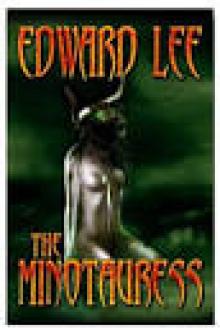 The Minotauress
The Minotauress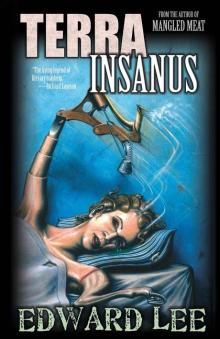 Terra Insanus
Terra Insanus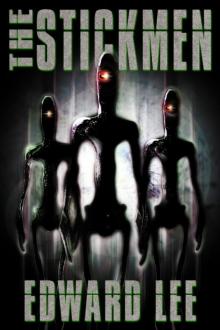 The Stickmen
The Stickmen Flesh Gothic by Edward Lee
Flesh Gothic by Edward Lee Family Tradition
Family Tradition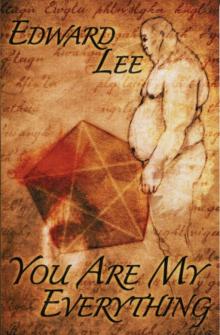 You Are My Everything
You Are My Everything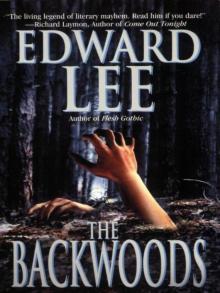 The Backwoods
The Backwoods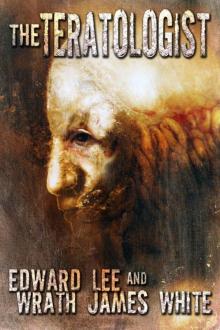 The Teratologist
The Teratologist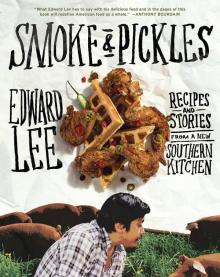 Smoke and Pickles
Smoke and Pickles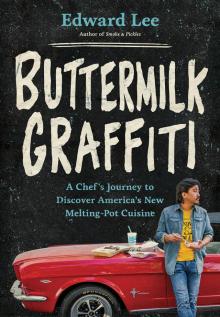 Buttermilk Graffiti
Buttermilk Graffiti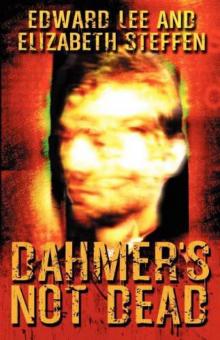 Dahmer's Not Dead
Dahmer's Not Dead Quest for Sex, Truth & Reality
Quest for Sex, Truth & Reality The Innswich Horror
The Innswich Horror Brides Of The Impaler
Brides Of The Impaler Goon
Goon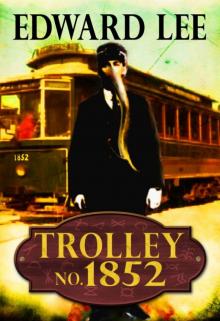 Trolley No. 1852
Trolley No. 1852 Sacrifice
Sacrifice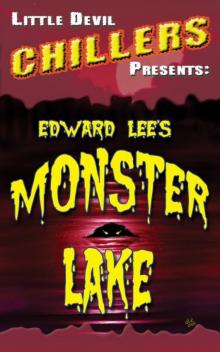 Monster Lake
Monster Lake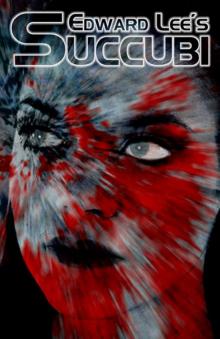 Succubi
Succubi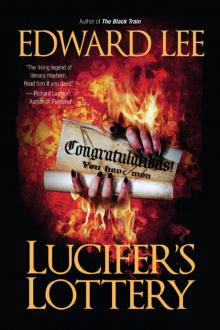 Lucifer's Lottery
Lucifer's Lottery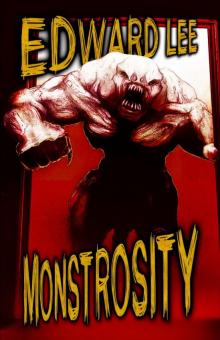 Monstrosity
Monstrosity The House
The House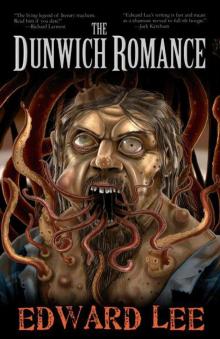 The Dunwich Romance
The Dunwich Romance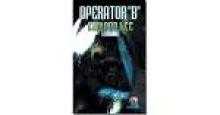 Operator B
Operator B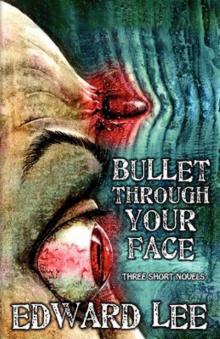 Bullet Through Your Face (improved format)
Bullet Through Your Face (improved format)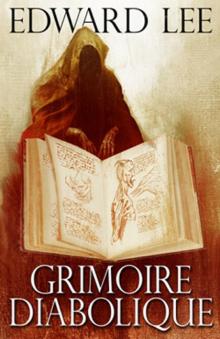 Grimoire Diabolique
Grimoire Diabolique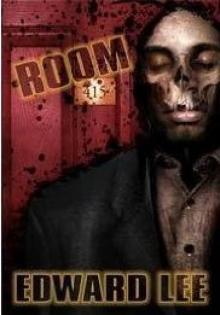 Room 415
Room 415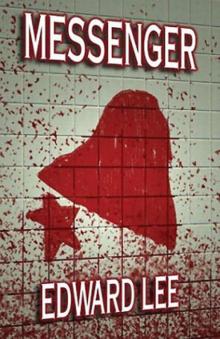 The Messenger (2011 reformat)
The Messenger (2011 reformat)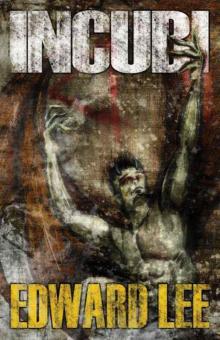 Incubi
Incubi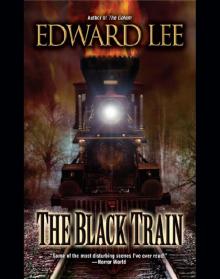 The Black Train
The Black Train House Infernal by Edward Lee
House Infernal by Edward Lee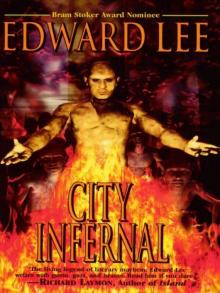 City Infernal
City Infernal Creekers
Creekers The Haunter Of The Threshold
The Haunter Of The Threshold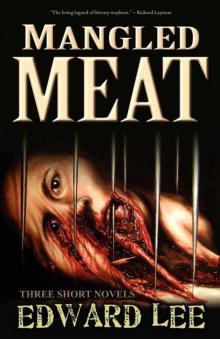 Mangled Meat
Mangled Meat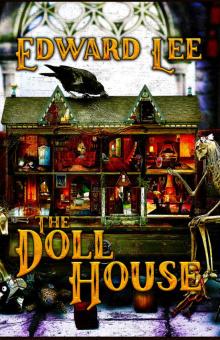 The Doll House
The Doll House Header 2
Header 2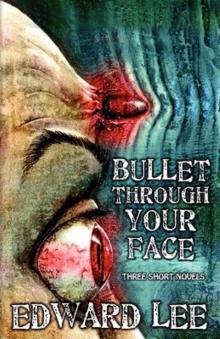 Bullet Through Your Face (reformatted)
Bullet Through Your Face (reformatted)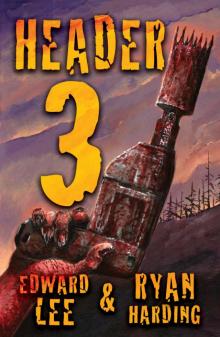 Header 3
Header 3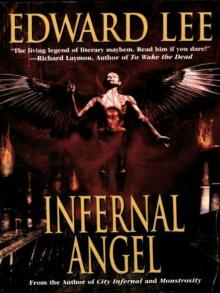 Infernal Angel
Infernal Angel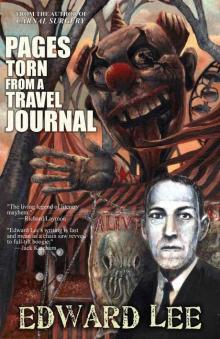 Pages Torn From a Travel Journal
Pages Torn From a Travel Journal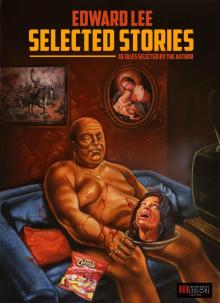 Edward Lee: Selected Stories
Edward Lee: Selected Stories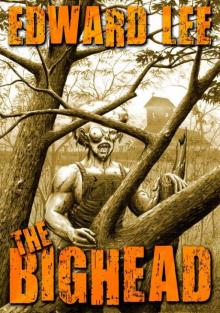 The Bighead
The Bighead The Chosen
The Chosen